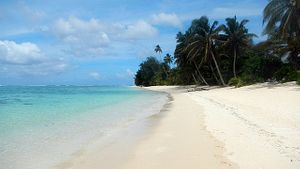The Organization for Economic Co-operation and Development (OECD) has determined that the Cook Islands are on a steady enough trajectory to graduate from its Official Development Assistance (ODA) classification as “developing,” to “developed.” The country will officially have its status reclassified late in 2018.* While this is a considered a positive achievement, and should be acknowledged as such, the classification comes with some major challenges in term of how the Cook Islands will transition to its new status.
The Cook Islands consists of 15 small islands, with a population of just 21,000 within an Exclusive Economic Zone (EEZ) of 1,800,00 square kilometres (690,000 sq mi) of ocean. This makes the per capita cost of delivering essential services far greater than in other developed nations with larger, more densely situated, populations. Until now the Cook Islands has relied heavily on developmental assistance provided due to its status as a developing nation to help overcome the difficulties of this geographic reality.
With its reclassification as a developed nation, the country will no longer be eligible for development assistance through the OECD’s Development Assistance Committee (DAC), and will need to restructure its financial arrangements accordingly. The country received US$51 million in Overseas Development Assistance grants for the 2017/18 financial year. Upon reclassification these grants will not longer be available.
While the Cook Islands has been gradually reducing its dependence on development assistance of the past few years, the transition may be difficult, especially with an economy that relies heavily on tourism as its primary source of income. While this sector has been booming in recent years, with annual arrivals numbering around 140,000, any downturn would have significant economic costs. Finding a way to diversify their income, through new trading partnerships and foreign investment, to meet their new responsibilities will now be a priority for the country.
However, the requirements to find new sources of revenue may come into conflict with the Cook Islands’ recent plans to dedicate its entire Exclusive Economic Zone (EEZ) as a marine reserve, a process that has begun with an area of 95,000 square nautical miles being protected from all large-scale commercial fishing and seabed mineral extraction.
In light of the country’s shifting interests, the Cook Islands has begun making a renewed push to obtain full sovereignty. The Cook Islands is a country in “Free Association” with New Zealand. While it is a self-governing entity, having full control to create its own laws, New Zealand maintains responsibility for its defence and foreign affairs. The Cook Islands do not issue their own passports, but their people are citizens of New Zealand, with residential status within the islands.
Due to this arrangement, the Cook Islands are not considered a fully sovereign state and do not have a separate seat at the United Nations. However, there have been a number of attempts by the Cook Islands government to obtain this status, but New Zealand has argued that this would threaten the ability of Cook Islanders to live and work in New Zealand. Currently there are 60,000 Cook Islanders living in New Zealand, triple the amount who live on the Cook Islands. The Cook Islands Finance Minister Mark Brown recently floated the idea of an arrangement of automatic dual citizenship as a way maintain their association, but provide a status for UN recognition.
The timing of the Cook Islands’ push to gain full sovereignty is not only due to their changing economic circumstances, but as an attempt to gain the attention of the incoming New Zealand government. With coalition talks still taking place, the Cook Islands can’t afford to have their interests ignored within the jostle of other interest groups taking place as a new government is formed. A renewed bid of UN membership is their major card to play to make sure the new NZ government is aware of their concerns.
UN membership may also provide options for the Cook Islands to compensate for the programs it will lose due to its new classification by the OECD. The Cook Islands are currently on the list of Small Island Developing States (SIDS). These are a group of countries recognized to be facing specific social, economic, and environmental issues at the United Nations Conference on Environment and Development (UNCED). However, without being a full member of the United Nations the country misses out on a number of opportunities that flow through several agencies within the UN. Gaining full sovereignty may enable the country to offset any development losses through the OECD with new programs through the UN.
*Clarification: The OECD has provided the Cook Islands with an extension to the end of 2018 for the government to develop and submit additional data to determine the Cook Islands’ eligibility for ODA. The decision on the Cook Islands’ graduation will be made at the end of 2018.

































